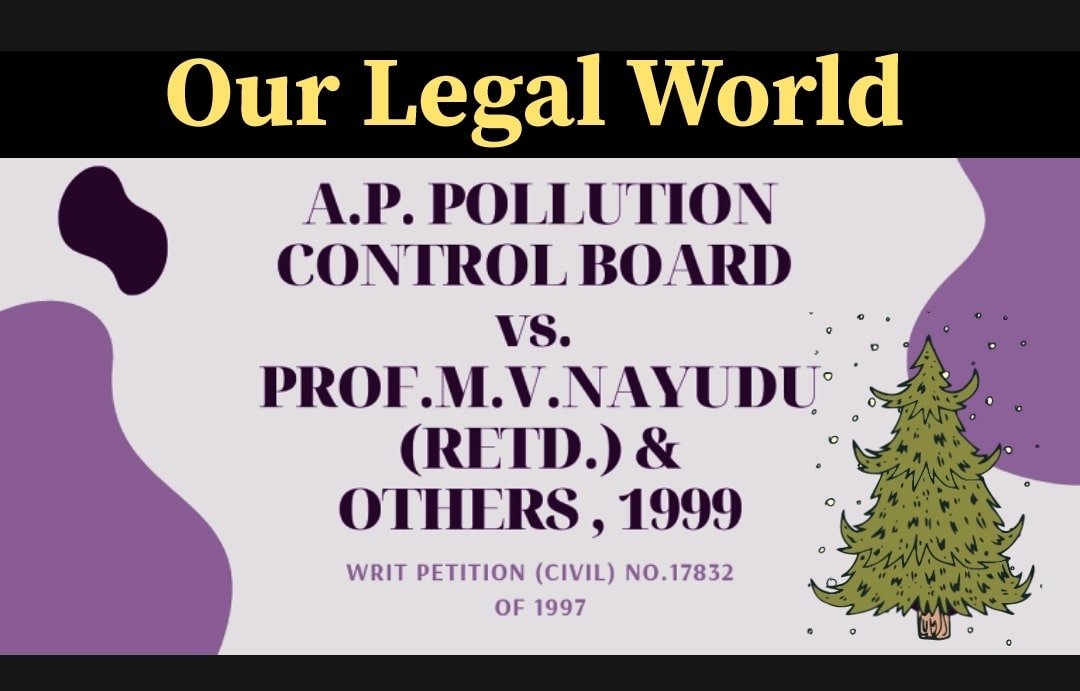A.P. Pollution Control Board vs. Prof. M.V. Nayudu (Retd.) and Others (1999)
In Supreme Court of India Writ Petition (Civil) No.17832 of 1997 Citation 1994 (3) SCC 1 Petitioner A.P. Pollution Control Board Respondent Prof. M.V. Nayudu (Retd.) & Others Date of Judgement 27/01/1999 Bench Justice S.B. Majmudar, Justice M. Jagannadha
Background of the case:
A Special Leave Petition (SPL) was filed by the A.P Pollution Control Board under Article 136 of the Constitution of India against M/s Surana Oil and Derivatives India Limited (respondent company). The respondent industry sought after to supply produce B.S.S. Castor Oil derivatives like Hydrogenated Castor Oil, 12-Hydroxy Stearic Acid, Dehydrated Castor Oil, methylated 12-HSA, Fatty Acids with by products like Glycerine, Spent Bleaching Earth, Carbon and Spent Nickel Catalyst. Before setting up an industry it had been subjected to numerous clearance.
People’s Union for Civil Liberties v. Union of India, (2002) 5 SCC 294
In 1995, the respondent industry applied to the Ministry of Industry, Government of India(GOI) for letter of Intent under the Industries (Development Regulation) Act, 1951. The Government of Andhra Pradesh wrote to the Ministry of Industry, GOI as under: “The State Government recommends the application of the unit for grant of letter of intent for the manufacture of B.S.S. Castor Oil relaxing the locational restriction subject to No Objection Certificate (NOC) from A.P. Pollution Control Board, previous of taking implementation steps. In 1996, the GOI issued the letter of intent for manufacture of B.S.S. Grade Castor Oil (15,000 tons per year) and Glycerine (600 tons per year) subject to bound conditions which are as follows:
- Confirmation Certificate from the State Director of Industries.
- Certificate from the involved State Pollution Control Board.
As per the above conditions set down by the GOI, the respondent industry applied to A.P. pollution Control Board for NOC. The application of the industry was rejected by the Board on the subsequent grounds:
- The unit could be a polluting industry and falls under ‘RED’ class of the classification adopted by Ministry of Environment and Forest.
- The projected industry was placed within 10k.m. radius of the two lakes, Himayat Sagar and Osman Sagar that was prohibited not solely by the Ministry of Environment and Forest however additionally by the Government of Andhra Pradesh.
An appeal was filed by the respondent industry under Section 28 of the Water Act, 1974. An affidavit was filed before the appellate authority stating that it had adopted the newest eco-friendly technology using all the safeguards concerning pollution. Also, it had been ensured that the industry won’t discharge any acidic effluents and the solid waste that are the by-products are saleable and that they are going to be collected in M.S. drums by mechanical method and sold. On the above contentions, the appellate authority declared that said industry isn’t a polluting industry.
The respondent industry, in its turn filed a Writ Petition for guiding the A.P. Pollution Control Board to administer its consent as a consequence to the order of the appellate authority. The Andhra Pradesh remarked the order of the appellate authority under Section 28 of the Water Act, 1974 and held that simply because an industry produced hazardous substance, the consent couldn’t be refused. The High Court directed A.P. Pollution Control Board to grant consent subjected to such conditions as might be imposed by the Board. It is against this order, the Pollution Control Board filed this special leave petition.
Issues:
- The validity of the orders passed by the A.P. Pollution Control Board?
- The correctness of the orders of the Appellate Authority under section 28 of the Water Act, 1974?
- The validity of exemption granted for the operation of the 10 k.m. rule?
- In what ways that the technological aspects of the environmental law cases ought to be adjudicated?
Judgement:
In the impugned judgment, the Supreme Court relied on the judicial doctrine of the Precautionary Principle and also the new Burden of Proof place forth in the Vellore Citizens Welfare Forum vs. Union of India and Others [ 1996 (5) SCC 647]. The Precautionary Principle as it is very name suggests needs the authorities in charge to anticipate, prevent and attack the reason behind environmental pollution. This rule is based on the salutary theory that it is better to err on the side of caution and safety than in the wrong way wherever environmental damage, once done, is also irreversible. In other words, one ought to take measures in anticipation of environmental damage, instead of to hunt cure when the damage is inflicted. It would be better to stay safe earlier then be sorry later. Hindrance is healthier than cure.
The Court in the present judgment directed that the authority to be appointed under Section 3(3) of the Environment (Protection) Act, 1986 that shall implement the Precautionary Principle and also the Polluter Pays Principle. Further, it had been discovered that the new conception envisages that when a risk of great or irreversible damage to the environment is perceived, the burden of proof lies on the one that is proposing to undertake the activity in question.
The Apex Court, command that the Government can’t grant exemption to a specified industry located within or making an attempt to locate within area wherever there was total prohibition against the establishment of industries. The Water Act, 1974 doesn’t allow the State Government to exempt an industry from the applying of the prohibitive order under Section 3(2)(v) of the Environment Protection Act, 1986. So, the consent of the A.P. Pollution Control Board was validly refused.
The Court felt an urgent need to make appropriate amendments so as to ensure that at all times, the appellate authorities or tribunals include Judicial and conjointly technical personnel well versed in environmental laws. The same suggestion was given by this court in the M.C. Mehta and Another vs. Union of India and Others and Shriram Foods and Fertilizers Industries and Another v. Union of India and Others (AIR 1987 SC 965)
The Court further directed that the Central Government should constitute an authority under Section 3(3) of the Environment Protection Act. Such authority shall be headed by a retired Judge of the High Court and it may have other members ideally like an expertise in the field of pollution control, environment protection to be appointed by the Central Government.
References:
- P. Pollution Control Board Vs Prof.M.V. Nayudu https://indiankanoon.org › doc
- https://www.casemine.com › search
A.P pollution control board vs. Prof.M.V. Nayudu
- The Water (Prevention and Control of Pollution) Act, 1974
- The Environment (Protection) Act, 1986







